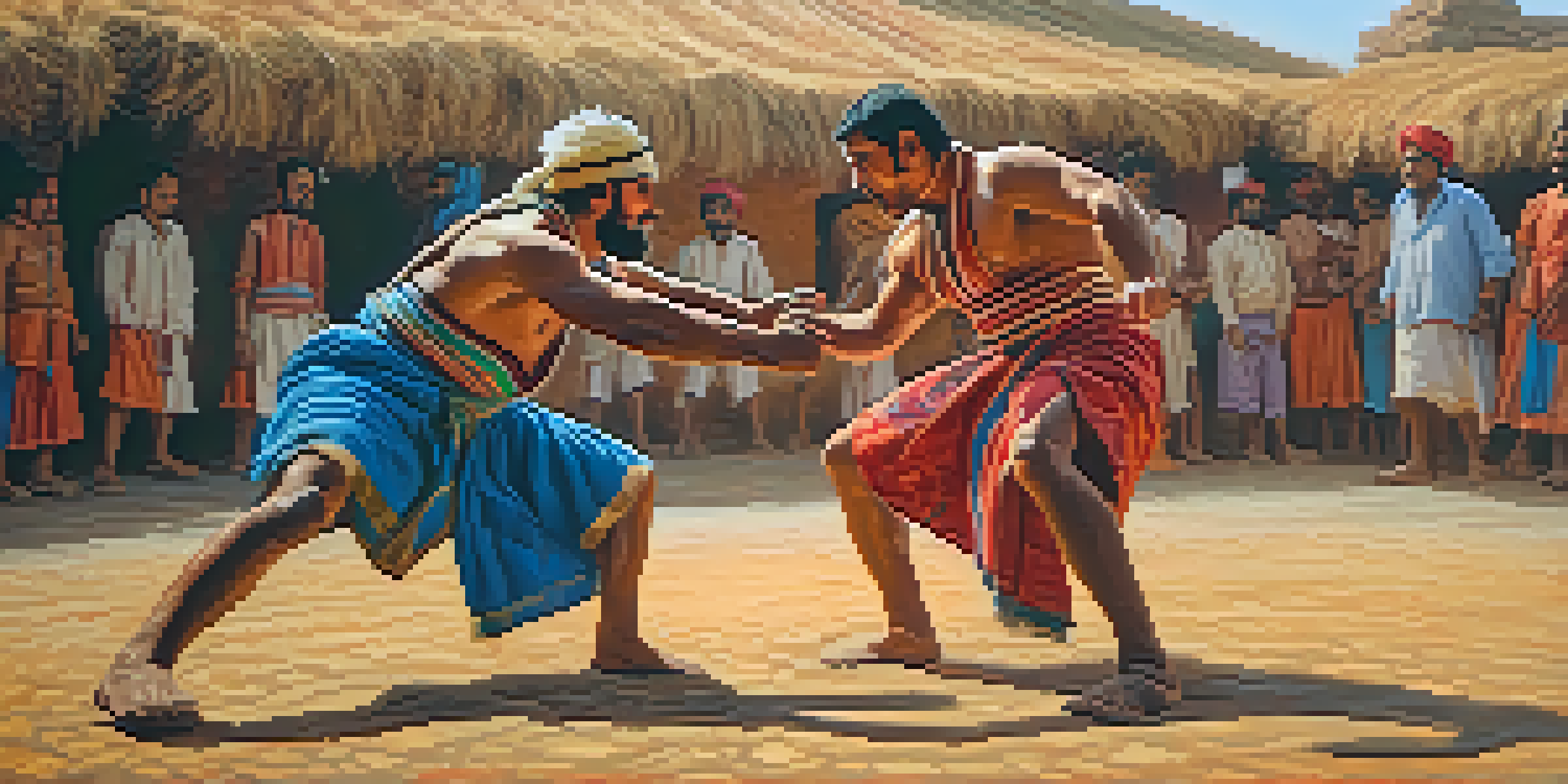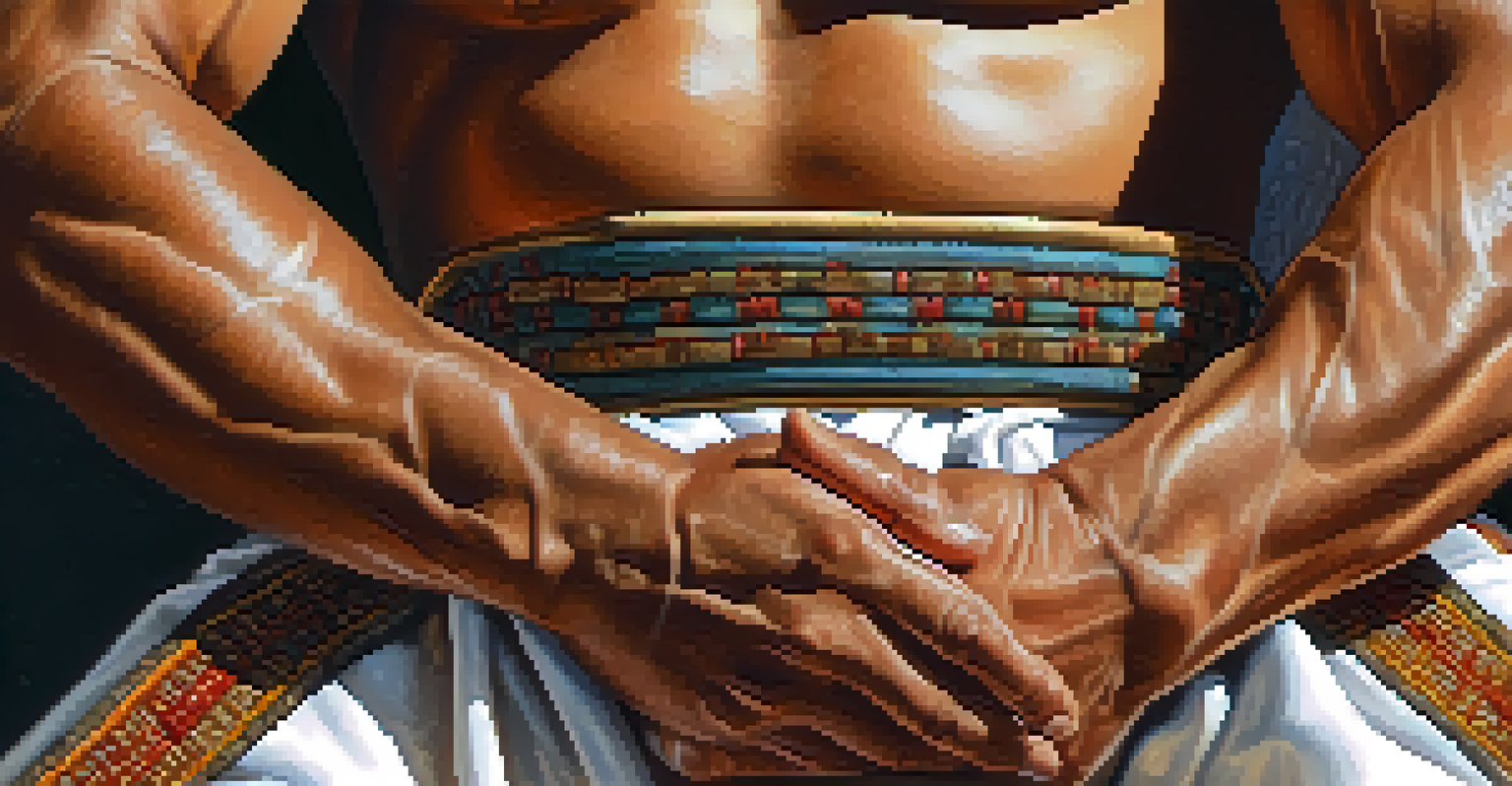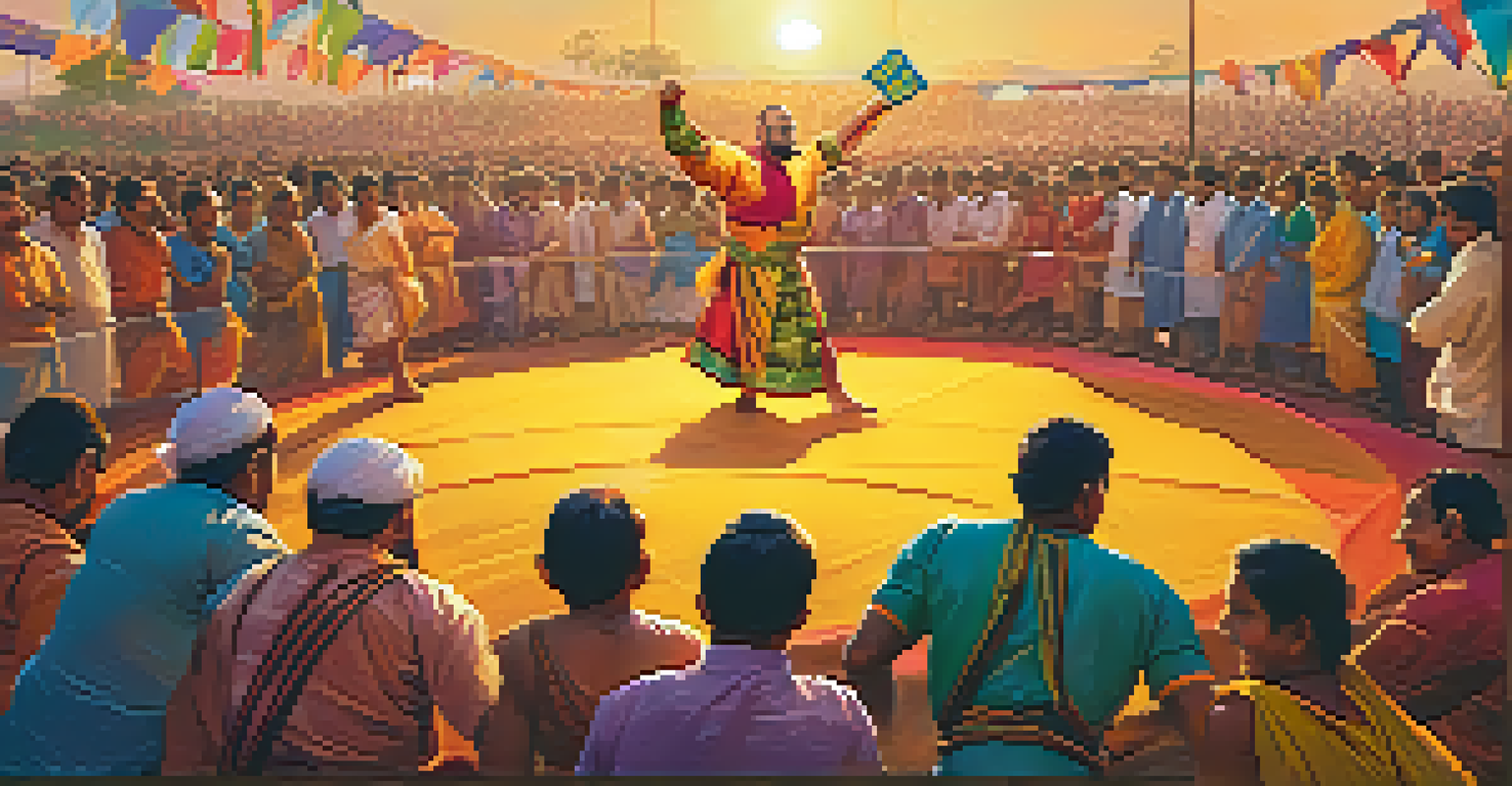Traditional Wrestling: The Rich Heritage of Pehlwani

Understanding Pehlwani: A Glimpse into Traditional Wrestling
Pehlwani, also known as Kushti, is a form of traditional Indian wrestling that has deep roots in the country's culture. Originating from ancient India, this sport has been a part of the society for centuries, often associated with strength, discipline, and honor. Wrestlers, known as 'Pehlwans,' train rigorously to showcase their skills and maintain the rich traditions that accompany the sport.
Wrestling is not just a sport, it's a way of life.
The essence of Pehlwani lies not just in physical strength but also in mental toughness and respect for one's opponent. Wrestlers often practice in 'Akhadas,' which are dedicated training grounds, where they engage in various exercises and techniques. This environment fosters camaraderie and a sense of community among the wrestlers, making it more than just a sport.
Pehlwani is not only about competition; it encapsulates a way of life that emphasizes physical fitness and moral values. By understanding Pehlwani, one can appreciate the intricate blend of tradition, culture, and athleticism that defines this remarkable sport.
The Historical Roots of Pehlwani in India
The history of Pehlwani can be traced back to ancient texts and scriptures, which mention wrestling as a celebrated activity. It is believed that wrestling was practiced in the courts of kings, where it was seen as a demonstration of valor and skill. Over the years, this sport evolved, absorbing influences from various cultures and regions across India.

One of the most significant periods for Pehlwani was during the Mughal era, when it gained immense popularity among the nobility. The Mughal emperors themselves were known to engage in wrestling, which helped elevate the sport's status. This royal patronage not only enhanced the techniques and styles but also encouraged the establishment of more structured training facilities.
Pehlwani: A Cultural Legacy
Pehlwani is a traditional Indian wrestling sport that embodies strength, discipline, and community values.
As the years progressed, Pehlwani became intertwined with the fabric of Indian society, celebrated in festivals and community gatherings. Its historical significance can be seen in the way it has shaped local identities and fostered unity among different communities, making it a truly national treasure.
The Role of Akhadas in Pehlwani Training
Akhadas are the heart and soul of Pehlwani, serving as training centers where wrestlers hone their skills. These spaces are not just about physical training; they also emphasize the importance of discipline, respect, and spirituality. Each Akhada has its own rituals and customs, creating a unique atmosphere that motivates wrestlers to push their limits.
In wrestling, you learn to respect your opponent, and in life, you learn to respect everyone.
Training in an Akhada typically involves a mix of traditional exercises, such as 'dand' (push-ups) and 'baithak' (squats), alongside wrestling techniques. Wrestlers often engage in 'Malla Yuddha,' which is the actual wrestling practice that helps them perfect their moves. This rigorous routine builds not just strength but also enhances agility and strategy.
Moreover, Akhadas are spaces of mentorship, where seasoned Pehlwans guide newcomers. This generational transfer of knowledge ensures that the rich heritage of Pehlwani continues to thrive, fostering a strong bond among wrestlers that transcends mere competition.
Cultural Significance of Pehlwani in Indian Society
Pehlwani is deeply embedded in the cultural landscape of India, often celebrated during festivals and local events. It serves as a means of showcasing not just physical prowess but also cultural values such as bravery, honor, and respect for traditions. The sport has a unique ability to unite people from diverse backgrounds, fostering a sense of community.
Additionally, Pehlwani has influenced various forms of art and literature, inspiring countless stories, poems, and paintings. This artistic representation highlights the admiration and respect that society holds for wrestlers, elevating their status to that of local heroes. Such cultural narratives reinforce the importance of Pehlwani in preserving India's rich heritage.
Akhadas: The Heart of Training
Akhadas serve as vital training centers for wrestlers, emphasizing physical and moral development through rigorous practice.
Furthermore, the sport has also played a role in social movements, symbolizing strength against oppression and the fight for justice. This multifaceted significance of Pehlwani showcases its integral role in both individual lives and the broader societal context.
Modern Adaptations of Pehlwani Wrestling
As society evolves, so does Pehlwani, adapting to contemporary influences while retaining its core values. Modern wrestlers often integrate techniques from other styles, such as freestyle wrestling, to enhance their performance. This blending of techniques not only makes the sport more dynamic but also attracts a younger audience eager to learn.
Additionally, the advent of technology has transformed training methodologies. Wrestlers now have access to online coaching, video analysis, and fitness apps, allowing them to refine their skills and strategies more effectively. Such innovations are crucial in keeping the sport relevant in today's fast-paced world.
However, the essence of Pehlwani remains intact, with wrestlers continuing to honor traditional practices and values. This balance between tradition and modernity is what makes Pehlwani a compelling sport that resonates with both the older generation and the youth alike.
The International Recognition of Pehlwani
In recent years, Pehlwani has gained international recognition, with several wrestling competitions showcasing this traditional style. Events like the Commonwealth Games have included various forms of traditional wrestling, bringing Pehlwani into the global spotlight. This exposure not only elevates the sport but also attracts international interest and appreciation.
Moreover, Indian wrestlers who excel in Pehlwani have begun to compete on international platforms, representing their culture while embracing global wrestling styles. Their success stories serve as inspiration for aspiring athletes, proving that dedication and hard work can lead to recognition beyond borders.
Modern Challenges for Pehlwani
Despite its rich heritage, Pehlwani faces challenges such as lack of financial support and fading interest among youth.
This international admiration for Pehlwani underscores the importance of preserving traditional sports in a rapidly changing world. It reminds us that while we embrace modernity, we should also cherish and promote our rich cultural heritage.
Challenges Facing Pehlwani in the Modern Era
Despite its rich heritage, Pehlwani faces several challenges in the modern era. One of the primary issues is the lack of financial support and sponsorship for traditional wrestlers. Many talented athletes struggle to find resources for training and competitions, making it difficult to pursue their passion full-time.
Furthermore, the changing landscape of sports entertainment often sidelines traditional forms like Pehlwani in favor of more commercialized sports. This shift can lead to a decline in participation and interest among younger generations, threatening the continuity of this ancient practice. It's essential to find ways to engage youth and educate them about the benefits of traditional wrestling.

Lastly, the preservation of Pehlwani as a cultural practice amidst globalization is a significant concern. As western sports gain popularity, there’s a risk that traditional practices may be overlooked or forgotten. Addressing these challenges requires a collective effort from communities, governments, and sports organizations to ensure that Pehlwani continues to thrive.